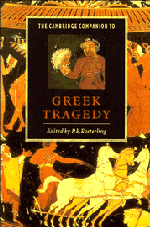2 - A show for Dionysus
from Part I - Tragedy as an institution
Published online by Cambridge University Press: 28 May 2006
Summary
Since Nietzsche published The Birth of Tragedy in 1872 Dionysus has been the dominant Greek deity in the imaginations of scholars. His glamorous and ambiguous personality has stimulated a great deal of research and interpretation, recently intensified by the discovery of new evidence for Dionysiac mystery cult. Not all the factors at work have been academic and intellectual; in the 1930s, for example, the power of Dionysus could be strongly felt in the rallies orchestrated by Hitler and Mussolini (R. P. Winnington-Ingram wrote his pioneering Euripides and Dionysus under the influence of his response to fascism). Since the Second World War Dionysus has found a new place in theatrical life, largely because Bacchae has seemed to actors, directors and audiences to need so little mediation as a play for the times, in which drug culture, rock music, sex and violence, the many varieties of modern ecstatic cult, and even football hysteria all find recognisable analogues.
Yet despite the intensive and brilliant work devoted to Dionysus in his ancient context we still have to face some obstinate puzzles. If tragedy at Athens was originally and essentially under the sign of Dionysus, though other deities would appropriate drama for their own festivals in due course (see Ch. 9, pp. 223-4), what was it about this art form that was particularly Dionysiac? Was there a logic in the Athenian construction of Dionysus that made him uniquely appropriate as god of the drama, and especially of tragic drama? (Comedy has seemed to pose less acute problems because of its more obvious appropriateness for performance at festivals in honour of the wine-god.) Was it a matter of stories about Dionysus shaping the mythological groundwork and plot patterns of tragedy, as used to be the standard view, or of the god's symbolic characteristics - as the Other, the outsider, sexually ambivalent, transformative, elusive - making him good to think with, or of the distinctively dramatic features of his rituals (the mask, ecstatic possession, mystic initiation)?
- Type
- Chapter
- Information
- The Cambridge Companion to Greek Tragedy , pp. 36 - 53Publisher: Cambridge University PressPrint publication year: 1997
- 44
- Cited by

